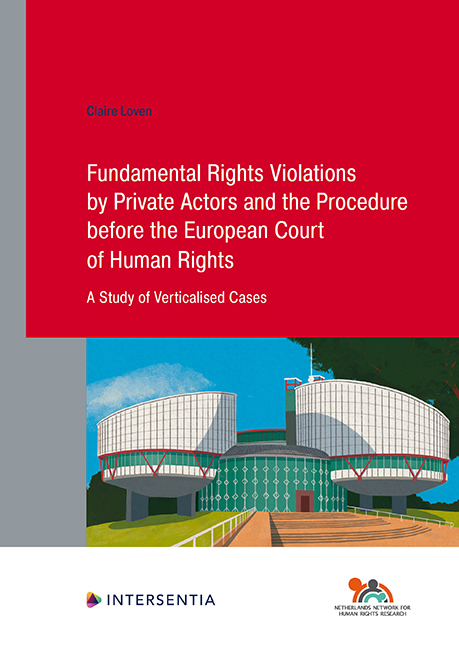 Fundamental Rights Violations by Private Actors and the Procedure before the European Court of Human Rights
Fundamental Rights Violations by Private Actors and the Procedure before the European Court of Human Rights Building on the analyses provided in the first parts of this study, this final part contains a proposal for a new approach to verticalised cases. This aims to address the problems arising in such cases, as identified in Part III. To reiterate, these problems find their origins in the main characteristic of verticalised cases, whereby one of the original parties in the domestic conflict is not involved in the Court's proceedings and thus disappears. For private actors, this results in the ‘disappeared party’ not being able to defend or explain his acts, interests or rights, even though these may be part of the Court's examination and while this party may be affected by a judgment of the Court. This situation is not only problematic for private actors, but also for the Court and the Convention States: the Court may have to examine a case without having a full and balanced account of the facts and the rights and interests at stake, while Convention States may be asked to defend the rights and interests of the disappeared party even though they may be unwilling to do so or incapable of such. Domestic courts, moreover, may encounter problems when applying and enforcing a judgment of the Court in a verticalised case since this judgment may not necessarily give a complete picture of the legal positions and interests involved.
To address these problems in verticalised cases, it is proposed redesigning the thirdparty intervention procedure of Article 36 ECHR by granting third parties with a legal interest in the case (‘actual third parties’) a right to intervene in the Court's proceedings. The proposed procedural change will create a genuine and effective opportunity for the original party in the conflict at the domestic level to defend or explain his acts, interests or rights in the Court's proceedings. Although this suggests a focus on private actors’ perspective, attention is also paid to the perspectives of Convention States and the Court, with an explanation of how redesigning the third-party intervention procedure will benefit these parties too. At the same time, practical aspects of the proposed new approach for Convention States and the Court are considered, including the implications for the Court's workload.
It follows from the above that the prime focus of the proposal for a new approach to verticalised cases is not the Court's review of verticalised cases as such, but rather the procedural framework.
To save this book to your Kindle, first ensure [email protected] is added to your Approved Personal Document E-mail List under your Personal Document Settings on the Manage Your Content and Devices page of your Amazon account. Then enter the ‘name’ part of your Kindle email address below. Find out more about saving to your Kindle.
Note you can select to save to either the @free.kindle.com or @kindle.com variations. ‘@free.kindle.com’ emails are free but can only be saved to your device when it is connected to wi-fi. ‘@kindle.com’ emails can be delivered even when you are not connected to wi-fi, but note that service fees apply.
Find out more about the Kindle Personal Document Service.
To save content items to your account, please confirm that you agree to abide by our usage policies. If this is the first time you use this feature, you will be asked to authorise Cambridge Core to connect with your account. Find out more about saving content to Dropbox.
To save content items to your account, please confirm that you agree to abide by our usage policies. If this is the first time you use this feature, you will be asked to authorise Cambridge Core to connect with your account. Find out more about saving content to Google Drive.